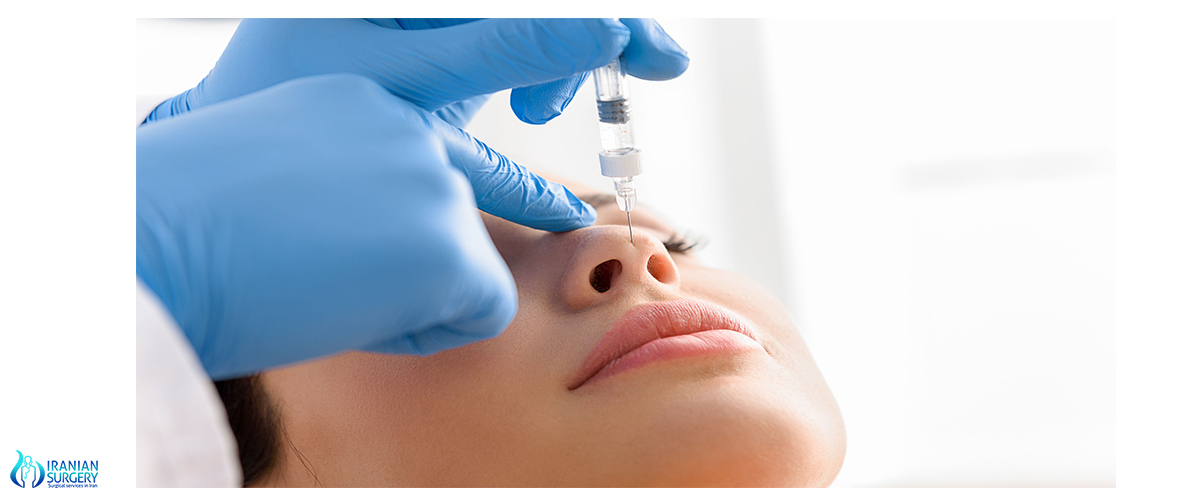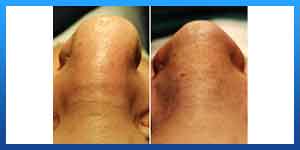Complications after Rhinoplasty

Risks and Complications of Rhinoplasty
Fortunately, significant complications from rhinoplasty are infrequent. Your specific risks for rhinoplasty will be discussed during your consultation.
All surgical procedures have some degree of risk. Some of the potential complications of all surgeries are:
 . Adverse reaction to anesthesia
. Adverse reaction to anesthesia
. Hematoma or seroma (an accumulation of blood or fluid under the skin that may require removal).
. Infection and bleeding
. Changes in sensation
. Scarring
. Allergic reactions
. Damage to underlying structures
Other risks specific to rhinoplasty are outlined below:
. Skin problems or skin breakdown from bandaging or from grafting materials being exposed through thin skin, particularly if foreign materials have been inserted.
. Nasal blockage caused by swelling inside the nose
. Injury to your septum, the structure that separates your nostrils
. A raised scar at the base of the nose with the open approach
. Skin discoloration
. Difficulty breathing
. Nasal septal perforation (a hole in the nasal septum) is rare.
. Unsatisfactory results that may necessitate additional procedures (Possibility of revision surgery)
You can help minimize certain risks by following the advice and instructions of your board-certified plastic surgeon, both before and after your rhinoplasty.
Read more about : Pros and Cons of Deviated Septum Surgery
Signs of Infection after Rhinoplasty
Infection after Rhinoplasty
Surgery that involves incision in the skin can lead to a wound infection. A surgical wound infection can develop at any time from 2-3 days after surgery.
Signs and Symptoms of Infection
Some signs and symptoms of infection after rhinoplasty are as follows:
. Fever greater than 101.5 F
. Increased pain at the incision site
. Increased redness at the incision site
. Increased warmth at the incision site
. Foul odor coming from the incision
. Discharge draining from the incision Read more about laughing after rhinoplasty
Read more about : Rhinoplasty in Iran
Treatment
If it turns out you've developed an infection after plastic surgery, you'll probably be prescribed an oral antibiotic. If more drastic treatment is needed—your incision must be opened and drained, or an implant removed—it's likely you'll have a more prominent scar. The surgeon may be able to revise that later. You may need to be hospitalized for a severe infection so you can receive intravenous antibiotics. Remember, though, that infection after plastic surgery is rare. Follow your surgeon's instructions and you should get the result you wanted.
How to prevent infection after surgery
. Washing your hands frequently
. Taking your Antibiotics regularly as the doctor prescribe
. Keeping your wound clean and dry
. Keeping your hands clean and wash it properly before and after doing any wound care.
. Stop Smoking this time
. Use an antibacterial hand cleaner even if you’re unable to wash your hands
Rhinoplasty stitches infection
You should always keep the wound of stitches clean, wash the area with soap and water. Use a wet cotton swab on your stitches to loosen and remove any blood.
What are the signs of infected stitches?
. Redness or swelling around the stitches.
. If you have fever
. If your pain increase or your wound became tender.
. Warmth at or around your stitches.
. Blood or pus leaking from your stitches
Sinus infection after rhinoplasty
People who do rhinoplasty, more than the usual people suffered from acute or chronic sinusitis or allergies than usual. Because nasal surgery has an effect on the nasal skeleton bone and also allergies and sinusitis are affected by nasal mucosa and sinus openings. Because of this, the nasal surgery will not cause the aggravation of sinus infections or allergies.
Important tips after rhinoplasty
In order to go through the post-rhinoplasty process there are some important tips and instructions recommended by the Iranian surgeons, which ensure the follow-up to obtain positive results by a large percentage, including:
. Maintaining the cleanliness and sterilization of the nose, and do not run for at least twenty days.
. Use the sterilized nose pad until and replace it when needed.
. Keep the sticky plastic plaster on the nose for a week after the operation.
. Maintain dryness and firmness of nasal splint.
. Refrain from exercising any extra physical or physical activity during the first month after rhinoplasty.
. There are no contraindications after the operation, but it is preferable to rely on soft foods in the first days after surgery.
. Eternity is preferred to rest in the first ten days after surgery, and it is advisable to avoid sex during this period.
. Be careful when washing teeth, use a soft cleaning brush, and avoid contact with the upper lips.
. Avoid use of analgesics such as aspirin and ibuprofen, 15 days before surgery, and approximately the same duration after rhinoplasty.
. Refrain from frequent phone calls for two weeks after rhinoplasty.
. Follow the correct method when cleaning the face and body, and not expose the splint of the nose to water.
. For the first seven days after surgery, you should avoid exposing your facial muscles to excessive exertion, such as laughing, chuckling, yelling, and the like.
. The hair is washed with the help of another person so that the nasal splint is not exposed to any wetness.
. Wear clothing that is closed using buttons, and avoid wearing clothing that may touch the nose.
. Stay away from the sun's heat and radiation for a month and a half after surgery, as high temperature will increase the symptoms of swelling.
. Refrain from swimming for one month after surgery.
. Do not be disturbed by the change in the color of the skin of the nose and around the eyes and lips, as the inflammation or redness may be normal, and completely disappear within a month of the process.
Clean the nose after Rhinoplasty
Cleaning the nose after the nasal barrier or any types of rhinoplasty is one of the most important things should be done by the patient at home for three weeks after the procedure.
To do this, a dedicated tool or an empty syringe and a solution prescribed by the doctor will be used after removal of the needle and patient inserts it from one of the nostrils and injects the solution.
Medications after Rhinoplasty
After completing rhinoplasty, the Iranian doctors will prescribe you some medications that will help you get through the recovery process safely.
The vast majority of patients who undergo nasal surgery are given narcotic pain relievers for three to five days following surgery. At this point, pain is more easily tolerated and patients are switched to straight Tylenol.
Patients are typically given prophylactic antibiotics to prevent infection and in some cases steroids to minimize swelling. It’s not unusual for patients to be given decongestants as well.
In addition, patients are asked to avoid drugs that can potentially cause bleeding. Examples would include Aspirin, Motrin, Aleve and Ibuprofen.
- Rhinoplasty in Iran
- Rhinoplasty in Iran cost
- Revision Rhinoplasty in Iran
- Closed Rhinoplasty in Iran
- Open Rhinoplasty in Iran
- Before Rhinoplasty in Iran
- During Rhinoplasty in Iran
- After Rhinoplasty in Iran
- The common methods used in rhinoplasty in Iran
- Flying after Rhinoplasty in Iran
- Risks of Rhinoplasty in Iran
- Steps of Rhinoplasty in Iran
- Cleaning outside of nose after Rhinoplasty in Iran
- Best age for Rhinoplasty surgery
- Rhinoplasty Recovery
- Bad Rhinoplasty
- Features of a good Rhinoplasty surgery in Iran
- Infective complications related to Rhinoplasty surgery
10 common question
- Rhinoplasty
- Face lift
- Facial plastic surgery
- Lip augmentation
- Ear pinning
- Blepharoplasty
- Neck lift surgery
- Chin lift surgery
- Liposuction
- Abdominoplasty (tummy tuck)
- Body sculpting
- Arm Lift
- Brazilian Butt Lift
- Breast Augmentation
- Breast Lift
- Breast implant
- male breast reduction ( gynecomastia )
- sex reassignment surgery ( sex change )
- Vaginoplasty
- labiaplasty
- Hair transplant for male
- Female hair transplant
- Reconstructive surgery
- septoplasty
- breast reconstruction
- breast reduction
- Cleft lip and palate repair

